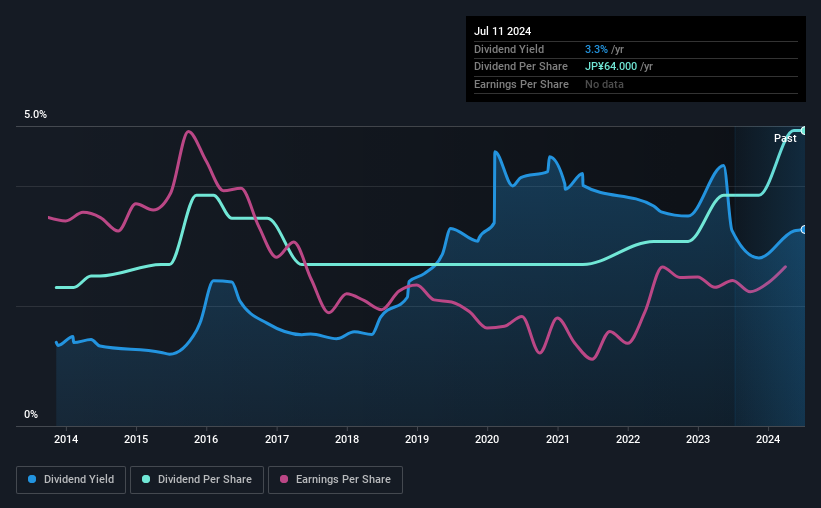Yamanashi Chuo BankLtd's (TSE:8360) Upcoming Dividend Will Be Larger Than Last Year's

The Yamanashi Chuo Bank,Ltd. (TSE:8360) has announced that it will be increasing its dividend from last year's comparable payment on the 5th of December to ¥32.00. The payment will take the dividend yield to 3.3%, which is in line with the average for the industry.
Check out our latest analysis for Yamanashi Chuo BankLtd
Yamanashi Chuo BankLtd's Payment Expected To Have Solid Earnings Coverage
Solid dividend yields are great, but they only really help us if the payment is sustainable.
Yamanashi Chuo BankLtd has a long history of paying out dividends, with its current track record at a minimum of 10 years. Past distributions do not necessarily guarantee future ones, but Yamanashi Chuo BankLtd's payout ratio of 30% is a good sign as this means that earnings decently cover dividends.
If the trend of the last few years continues, EPS will grow by 4.8% over the next 12 months. Assuming the dividend continues along recent trends, we think the future payout ratio could be 33% by next year, which is in a pretty sustainable range.

Dividend Volatility
The company's dividend history has been marked by instability, with at least one cut in the last 10 years. The annual payment during the last 10 years was ¥30.00 in 2014, and the most recent fiscal year payment was ¥64.00. This works out to be a compound annual growth rate (CAGR) of approximately 7.9% a year over that time. A reasonable rate of dividend growth is good to see, but we're wary that the dividend history is not as solid as we'd like, having been cut at least once.
Yamanashi Chuo BankLtd May Find It Hard To Grow The Dividend
With a relatively unstable dividend, it's even more important to see if earnings per share is growing. Earnings has been rising at 4.8% per annum over the last five years, which admittedly is a bit slow. While growth may be thin on the ground, Yamanashi Chuo BankLtd could always pay out a higher proportion of earnings to increase shareholder returns.
Our Thoughts On Yamanashi Chuo BankLtd's Dividend
Overall, it's great to see the dividend being raised and that it is still in a sustainable range. While the payout ratios are a good sign, we are less enthusiastic about the company's dividend record. Taking all of this into consideration, the dividend looks viable moving forward, but investors should be mindful that the company has pushed the boundaries of sustainability in the past and may do so again.
Companies possessing a stable dividend policy will likely enjoy greater investor interest than those suffering from a more inconsistent approach. Meanwhile, despite the importance of dividend payments, they are not the only factors our readers should know when assessing a company. For instance, we've picked out 1 warning sign for Yamanashi Chuo BankLtd that investors should take into consideration. If you are a dividend investor, you might also want to look at our curated list of high yield dividend stocks.
New: Manage All Your Stock Portfolios in One Place
We've created the ultimate portfolio companion for stock investors, and it's free.
• Connect an unlimited number of Portfolios and see your total in one currency
• Be alerted to new Warning Signs or Risks via email or mobile
• Track the Fair Value of your stocks
Have feedback on this article? Concerned about the content? Get in touch with us directly. Alternatively, email editorial-team (at) simplywallst.com.
This article by Simply Wall St is general in nature. We provide commentary based on historical data and analyst forecasts only using an unbiased methodology and our articles are not intended to be financial advice. It does not constitute a recommendation to buy or sell any stock, and does not take account of your objectives, or your financial situation. We aim to bring you long-term focused analysis driven by fundamental data. Note that our analysis may not factor in the latest price-sensitive company announcements or qualitative material. Simply Wall St has no position in any stocks mentioned.
Have feedback on this article? Concerned about the content? Get in touch with us directly. Alternatively, email editorial-team@simplywallst.com
About TSE:8360
Yamanashi Chuo BankLtd
Provides various banking services to individual and corporate customers in Japan.
Proven track record with adequate balance sheet.
Similar Companies
Market Insights
Community Narratives



